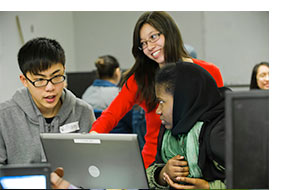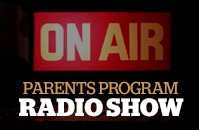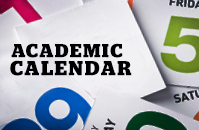Parent Magazine
Life Changers
BU undergrads help Boston Public School students shape their futures—and discover their own in the process.
By Julie Rattey
Photos by Kalman Zabarsky
Above: An Upward Bound student studies robotics.

Upward Bound students learn to program robots with the help of BU students and faculty.
“I don’t think I have what it takes to get into college,” the high schooler confided.
Monica Catinchi (SAR’14) didn’t agree. Her math tutee was bright: self-induced pressure and a challenging home environment, Catinchi believed, had made her tutee insecure. So as they worked together at Boston University’s summer Upward Bound Math Science—a federally funded national program for low-income and potential first-generation college students—Catinchi strove to boost the soon-to-be-senior’s confidence. She helped her understand the college application process and talked up the impressive qualities colleges would see in her, telling her, “You have to believe in yourself.” By the end of the session, Catinchi noticed a difference. “I felt really blessed,” she says, “to have the opportunity to help her get that motivation she needed.” She says she can’t wait to work with her tutee again this fall.
Catinchi is one of over 200 BU students who participate in the Boston University/Boston Public Schools Collaborative. The organization, which oversees more than a dozen school support programs, is a winning arrangement not only for the city and its students, but also for undergraduates, who gain confidence, personal satisfaction, and even career focus. The collaborative was established in 1975 in response to the court-ordered desegregation of Boston’s public schools—which, Director Ruth Shane (SED’73) notes, former leaders of BU’s School of Education helped achieve. The court order wasn’t just about bringing black and white together, she says; it was about “trying to bring quality education to all of the schools.”
Since then, the collaborative has been working to improve academics at BU’s public school partners through in-school, after-school, and summer programs. Today, these include Upward Bound and Upward Bound Math Science; the literacy tutoring program Boston University Initiative for Literacy Development (BUILD); Step UP, a national literacy program through which BU works with schools in Dorchester and Jamaica Plain, MA; and A+ College Prep Academy, a two-week summer program run through BU that prepares middle and high school students for their upcoming coursework. The collaborative also provides mentoring for recipients of the annual Thomas M. Menino Scholarship, a 40-year-old program that awards full BU tuition to 25 Boston public high school seniors. The University renamed the scholarship in 2013 to honor Boston’s outgoing mayor and his leadership in public education.
“I think the University sees these programs as a demonstration of our commitment to the city and to the citizens of Boston,” says Shane. “And I think BU is outstanding among the other colleges and universities in the city for its understanding about what that commitment needs to be.”

High school students from Chelsea, Brighton, and Charlestown, MA, work alongside BU students at an outreach event at BU's Metcalf Science Center.
BU undergrads, who serve as volunteer, work-study, or paid tutors and mentors, are critical to keeping that commitment. Shane points to undergrads’ literacy tutoring at the William Monroe Trotter Elementary School in Dorchester as an example. Trotter has been one of the city’s consistently underperforming schools, but Shane says that tutors’ work has helped raise students’ standardized test scores in literacy—and boosted the school as a result. “They’ve become an Innovation School, which means they’re getting some additional funds, as a result of making so much progress.”
Academic struggles over issues like literacy aren’t the only obstacles some Boston public school students face. Others include language barriers, lack of financial support, and family issues. “Some of these kids are actually responsible for their homes because their parents can’t get a job or have lost a job or never finished high school because they had to immigrate,” says Catinchi. Yet thanks to their own determination, and the support of their BU mentors, students succeed. Brankley Garcia, for example, is one of several Upward Bound participants who graduated high school as valedictorian in 2013. She is the first in her family to attend college. Alejandra Rodriguez (CGS’17) is a Menino Scholar who formerly expressed doubts about her future. A+ Academy tutor Jacob Ali (CGS’12, COM’14) told her, “I hope one day you realize that your goals are achievable, and that you have great potential.” After winning the scholarship, Rodriguez told Ali, “I pursued this because of you.”
Helping students make this kind of progress is rewarding for BU undergraduates, and reminds them why what they do is important. A student who struggles today, suggests Ali, could become the scientist who discovers a cure for cancer tomorrow. The experience can also stick with undergrads long past graduation. Former BUILD tutor Erinne Losinio (SED’07, CAS’07) still remembers creating a spelling game that got her students excited about writing and reading. “I felt a sense of satisfaction in helping the kids realize that working on literacy skills could be fun,” she says.
As undergrads help students find their potential, they discover and affirm their own. “You don’t know where the experience will take you,” says Mike Dennehy (CAS’92, SED’01), a former Upward Bound tutor who now directs BU’s branch of the program. Menino Scholar Eve Kantakas (SED’08, ’13) found her calling to be a teacher while serving as a work-study literacy tutor for BUILD. Catinchi, an aspiring speech pathologist at BU’s College of Health & Rehabilitation Sciences: Sargent College, says tutoring was good practice for helping patients overcome challenges and believe in themselves. And Ali says his interactions with Rodriguez affirmed his confidence in his people skills and a future career in public relations. “Teaching,” he says, “opens up realizations about you as a person.”
Visit the Boston University/Boston Public Schools Collaborative website to learn more about the individual collaborative programs.






